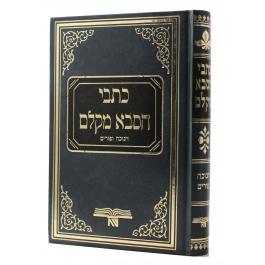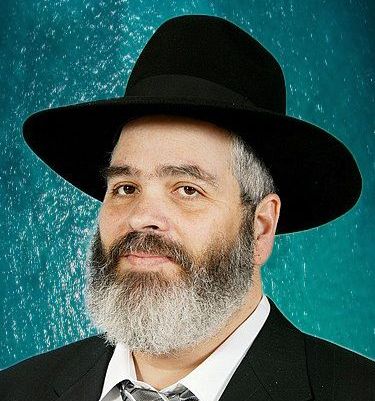  |
|
| ||||||
The next scheduled issue is for parshas Eikev. 
This Google Custom Search looks only in this website. Non-Jews Coming to Israel under the Law of Return
The judicial reform, accompanying the present government almost from its first day, has almost shunted aside all other topics, no less — and maybe more — important. The previous government succeeded in its one term to deal with many subjects, whose rectification will take a long time to accomplish.
While the leaders of the protest scream hoarsely, "democracy," they actually mean "demography." Whoever has been following it from the start, realizes that it does not deal with the judicial reform alone, but with broader issues dating many years back. The reform is not the reason sending all the demonstrators out to the streets. Granted, they have succeeded in frightening and convincing the man-in-the-street but everyone knows that if the judicial reform is dismissed altogether, the protesters will continue to mob the streets.
The Grandfather Clause of the Law of Return, passed in 1970, enabled every Jew to immigrate and settle in Israel as a citizen. The Grandfather clause determined that even one whose only connection of Judaism is through one of his grandparents could claim this right. The rationale behind this was defined as "the unification of families," enabling those who wished to immigrate to bring along their families as well. This was due to the extensive intermarriage in the Soviet Jewish community.
In the overall Israeli population, a fifth of first graders (19.6%) and almost a third of seventh graders (31.4%), are suffering from obesity, as compared to the chareidi stream of education where the average stands at only 12.5% for first graders and 23% for seventh graders.
The media is in no rush to quote that the rate of overweight among chareidi children is the lowest in the country, as reported by data from the Health Ministry for 2022 in "Data World," on the website of that Ministry.
Part I
This obituary of HaRav Simcha Zissel of Kelm zt"l was first published in print forty years ago. It is now being published online for the first time.
It was not without effort that R' Simcha Zissel of Kelm attained the spiritual stature that he did. He was blessed with extraordinary kochos hanefesh and brilliant talents, but these were not enough. It was necessary to channel and mold, to activate and regulate them. He used to say, "Who knows if man is worthy of bearing that description?"
"We will have much to tell succeeding generations," said the oldest son of the Saba of Kelm, "of what we had the privilege of seeing first hand as to the dimension of `Adam.'"
"You are wholly beautiful," R' Yisroel Salanter exclaimed of his disciple, referring to his spiritual perfection. "Even your shadow is goodly, without blemish."
OPINION
The national judicial advisor would do well to study the obfuscated wording of the high court president, Ms. Chayut. It will be remembered that she invalidated a Knesset legislation a week ago. In the judicial system it is commonly argued that nullifying a law passed by the Knesset is a rare and uncommon occurrence, requiring heavyweight reasons to warrant the court's interference with a law approved and passed by such a body.
But one who read Ms. Chayut's premises in doing so, discovers that one can do so even without using the criterion of reasonableness. Just like that, simply because she thinks otherwise than do the formulators and voters of the law.
Under consideration was a law created 18 years ago, whose purpose is to prevent foreign workers from remaining in the country after their residence permits expire. In order to create an incentive for them to leave, it was decided that their pension rights and other savings be frozen in a fund, and in the event that they did not leave the country at the designated time, the government would deduct part of the sum and, in some instances, appropriate the entire sum. This law worked and many more foreign workers left at the end of their contracts.
* * *
Outstanding Articles From Our Archives
Opinion & Comment
by Mordecai Plaut
The destruction of the Beis Hamikdosh was one of the worst expressions of the hatred that nations of the world have for the Jews. Its presence allowed the Jews to live a life focused on the service of Hashem in the ways that Hashem Himself arranged. It was the conduit for Heavenly beneficence that radiated to the whole world. It was a source of guidance and wisdom that had the potential to help all humanity.
The Beis Hamikdosh was wantonly destroyed - twice - on Tisha B'Av. The land upon which it was built was plowed under with salt, to utterly destroy the area and to try to ensure that it could never be rebuilt.
After the tremendous and stunning outpouring of hatred towards us from the Nazis, there was a significant dampening of those feelings of hatred for many years. If someone expressed antisemitic sentiments, one needed only to remind him of where those feelings had led the Nazis in order to silence him.
This is no longer the case...
IN-DEPTH FEATURES
by E. Weil
An amazing but true story of a six-month-old Jewish baby who survived the horrible war years through miraculous Hashgochoh protis. The story of her rescue from a situation our minds simply can not even imagine. An inspiring story of holocaust, danger . . . and hope.
*
And you are not exempt from telling,
Even if your words are tough as sinews,
And don't let idleness stop you from your task,
Sit and write personal Megillas Eichoh,
Yours, and your generation's,
To tell your children, when they ask you.
This is the personal mission driving Mrs. Leah (Hirschman) Nebenzahl as she tells the story of her life. When the events unfold, you may think that you're caught up in a well- written work of fiction. But truth is stranger than fiction.
As Leah told me her story, it's hard to imagine from her modest demeanor everything she went through. What's unique about Leah's story is what she defines as, "I wasn't there." She doesn't remember almost anything about "there." Everything she recounts is based upon what was told to her by family members and acquaintances. At a certain stage, these facts began to stir her memory and to help her slowly fit the pieces of her life story together. It is a miraculous story of the both the physical and the spiritual salvation of a Jewish soul.
A Nameless Baby
I was born in 1942, at the height of the war - no, I don't know in which month I was born - in the city of Apta - also known as Optov - to young parents. I was their first and only girl. My parents were in the ghetto - we don't know its name, either - and evidently my father was captured by the Nazis in one of the akzions and my mother joined him by choice. They believed the Germans' propaganda machine that told them that they were being transferred to labor camps.
Home and Family
by Chedva Ofek
Synopsis: The author describes the event of her birth. Her mother traveled to give birth in Tashkent, where there was a hospital, also to be near her own mother, who would care for the older sister. After the birth, the older child developed a very high fever, and the mother left the hospital with her infant, against the rules, and returned home. The three of them were in the grandmother's house when a terrible earthquake took place . . . In the blink of an eye, 100,000 people were left homeless . . .
With maternal instinct, my mother grabbed my sister in her arms and ran. In the confusion of the panic, cries for help and terrifying moments not knowing what would happen, they forgot about a helpless eight-day old baby neglected under the fireplace on the balcony. My uncle David was my savior. In spite of the confusion, he screamed to my mother, "Where's your baby?" and everyone screamed after him, "Oy! Where's the baby?"
My weak mother collapsed in fear. Everyone knew it was impossible to save me. No one would approach a house whose walls were shaking and would, any moment, lay in ruins. But Hashem's will was otherwise. My uncle David steeled himself and with incredible alacrity and unparalleled resourcefulness, supported himself with the trembling walls and entered the balcony.
The moment he stretched out his hands under the fireplace to pull me out, the fireplace fell on his head. He was injured and bleeding and moved unsteadily but delivered me alive and well to my mother's arms. A second later, the house collapsed in a pile of debris. Afterwards, we discovered that because the balcony was close to the outside, it had saved me. My uncle had enough time to get outside and save us both.
|
||||||




.jpg)



